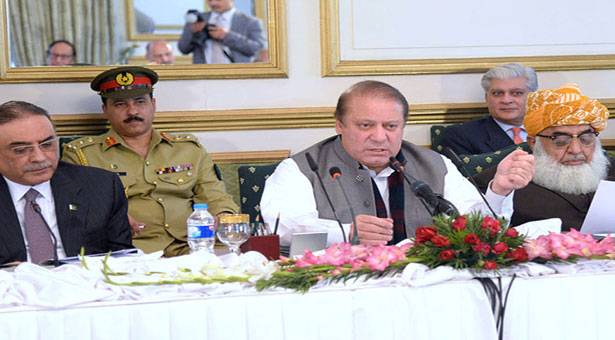There is an emerging consensus in Pakistan that there is no greater threat to our society than the one fundamental evil that has torn apart our social fabric, hurt our productivity, and has become the number one source of unrest – the evil of vulgarity. That consensus gives newspapers the time and resources to deal with other less urgent problems, such as terrorism. Today’s coverage is not just about the ways in which we can deal with the scourge of terrorism, but also how we can use it to our advantage.
Section 1: Slings and Arrows
– expert opinions on how to fight terror
“Let’s be clear – the terrorism that we face is a result of the failure of our own past policies. I don’t think it is possible to formulate a new policy without first looking at the reasons why the old policy did not work. After years of research, I have come to the conclusion that the key doctrine we should base our new policy on is that the state should support only those private armed militias and religiously motivated fighters who we are absolutely sure will not turn against us at some point in the future.”
– Professor Peeno (magician and English teacher)
“The government has been shirking its basic responsibilities. If they will not issue a press release after every terrorist attack, how will we know that it ‘condemns terrorism in all its forms and manifestations’, will ‘leave no stone unturned’ to ‘bring the culprits to justice’, and then ‘deal with the terrorists with an iron hand’? More importantly, how will we know that ‘Pakistani has made a lot of sacrifices in the war against terrorism’ and that ‘those who are responsible for this cowardly attack do not belong to any religion’?”
– Khan alias SP (crime reporter)
“Unfortunately, some aspects of all this violence that we are dealing with have been completely ignored. There has been no popular coverage of the effects of terrorism on cats. There is no research on how many cats have been killed or injured in terrorist attacks and how many of them were stray and how many pets. There has been no qualitative analysis of what kind of impact it has had on our society.”
– Shehryar Shirarty (civil society activist and freelance photographer)
Section 2: Peace of Mind – top new books about terrorism
1) Between Democracy and Terrorism – A shocking compilation of a series of insider accounts of a terrorist plot to not to anything and let Karachi destroy itself.
2) Pakistan, a Soft Country – the tale of a Taliban commander’s travels in Pakistan and his conversation with Pakistani citizens. This engaging and insightful reportage is an attempt to persuade the Taliban that they have been mistaken in seeing Pakistanis as their enemy.
3) Urdu Ki Aathween Kitab, and other Pakistani textbooks – Reading these books may reveal the underlying causes of violent extremism in the Pakistani society.
4) Military Ink – An edited anthology of articles about terrorism written by journalists known to be close to the Pakistani establishment.
5) Reconciliation – A complete guide to negotiating with terrorists.
Section 3: Terrortown – a profile
City: Karachi
History: The large port city was once a small fishing village named after a woman named Mai Kolachi, which translates roughly to a woman trapped in her house because of gang wars in her neighborhood, and too scared to step out since her two sons were killed outside an ATM booth over three thousand rupees.
Demographics: Ethnic rivalries are among the key reasons behind the unrest in Pakistan’s largest city, where various immigrant communities have picked up arms against other immigrant communities for changing the city’s demographics – a process they are all trying to reverse with guns.
Key challenges: According to a recent survey, the key law and order challenge that Karachi is dealing with is gangsters straying into each others territory. Not only has this been reported to cause gunfights in which innocent people are killed, it has also been confusing traders, who end up not knowing which gang they should pay extortion money to. Local activists have urged all gangs to stay in their own territories and carry out their extortion activities peacefully.
The second most important concern for the people of Karachi, according to the study, is the poor treatment of Muslims in the West. Another major dilemma that the residents of the provincial capital face often is what to wear to their friend’s wedding.
Thursday, April 18, 2024
Terror talk

The author has a degree in Poetics of Prophetic Discourse and works as a Senior Paradigm Officer. He can be contacted at harris@nyu.edu. Follow him on Twitter
ITP cracks down on traffic violations
April 18, 2024
Illegal housing societies in Rawalpindi to face crackdown
April 18, 2024
SZABIST traffic volunteers visit Safe City Islamabad
April 18, 2024
Hepatitis Challenge
April 18, 2024
IMF Predictions
April 18, 2024
Wheat War
April 18, 2024
Rail Revival
April 17, 2024
Addressing Climate Change
April 17, 2024
Justice denied
April 18, 2024
AI dilemmas unveiled
April 18, 2024
Tax tangle
April 18, 2024
Workforce inequality
April 17, 2024
New partnerships
April 17, 2024
ePaper - Nawaiwaqt
Advertisement
Nawaiwaqt Group | Copyright © 2024





